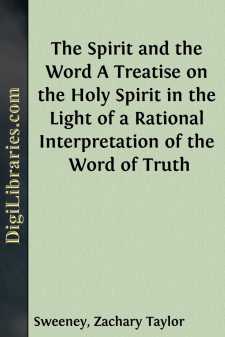Categories
- Antiques & Collectibles 13
- Architecture 36
- Art 48
- Bibles 22
- Biography & Autobiography 813
- Body, Mind & Spirit 142
- Business & Economics 28
- Children's Books 15
- Children's Fiction 12
- Computers 4
- Cooking 94
- Crafts & Hobbies 4
- Drama 346
- Education 46
- Family & Relationships 57
- Fiction 11828
- Games 19
- Gardening 17
- Health & Fitness 34
- History 1377
- House & Home 1
- Humor 147
- Juvenile Fiction 1873
- Juvenile Nonfiction 202
- Language Arts & Disciplines 88
- Law 16
- Literary Collections 686
- Literary Criticism 179
- Mathematics 13
- Medical 41
- Music 40
- Nature 179
- Non-Classifiable 1768
- Performing Arts 7
- Periodicals 1453
- Philosophy 64
- Photography 2
- Poetry 896
- Political Science 203
- Psychology 42
- Reference 154
- Religion 513
- Science 126
- Self-Help 84
- Social Science 81
- Sports & Recreation 34
- Study Aids 3
- Technology & Engineering 59
- Transportation 23
- Travel 463
- True Crime 29
The Spirit and the Word A Treatise on the Holy Spirit in the Light of a Rational Interpretation of the Word of Truth
Categories:
Description:
Excerpt
INTRODUCTION
Christianity is differentiated from all the other religions by the fact that it offers its followers a spiritual dynamic in living up to its precepts. That dynamic is the Holy Spirit, that sets the word of God on fire, warms the church from coldness to enthusiasm, and strengthens the Christian with a power not his own in the great battle between the flesh and the spirit.
Christianity is unique in making this offer. No other religion has any equivalent for it. The Holy Spirit is not obtained from the deductions of logic, the conclusions of philosophy nor from the investigations of science. All these are as silent as the grave regarding his presence and potency.
It is solely and distinctly a matter of divine revelation. It is not my purpose, therefore, to view this subject in the light of philosophic induction, logical deduction nor scientific investigation, but solely in the light of God's revelation. I shall gather the teaching of God's word around several important phases of the nature, mission and work of the Spirit. I do not speculate upon what God may do through his Spirit; I put no limit upon the power of the Spirit. He may work in a thousand ways, for aught I know. I am treating solely of that work of the Spirit which God has made plain in his revealed word.
For the sake of simplifying the treatment of the subject, I shall use the words "Spirit" and "Holy Spirit" instead of other terms used in the Scriptures. The Old Testament has eighty-eight distinct references to the Holy Spirit. In these references there are eighteen names applied. The New Testament refers to the Spirit two hundred and sixty-four times and uses thirty-nine names. Five names are common to both Testaments, which leaves fifty-two different appellatives for the Spirit. Seventeen appellatives express his relation to God, five his relation to the Son, five indicate his divine nature, seven describe his own character, while seventeen are used to indicate his relation to man. He is called the Holy Spirit, the Spirit of God, the Spirit of Christ, the Spirit of Jesus, the Spirit of his Son, of the Lord, of Truth, of Grace, of Holiness, of Glory, and of Adoption. He is called the Comforter, but this term never denotes his relation to man in general. It always describes a special relation to the apostles and their work.
I wish my readers to bring to the perusal of this work the same spirit of earnestness that I shall put into the task of producing it. We read in the language of Jesus that "every sin and blasphemy shall be forgiven unto men; but the blasphemy against the Spirit shall not be forgiven" (Matt. 12:31). "And every one who shall speak a word against the Son of man, it shall be forgiven him: but unto him that blasphemeth against the Holy Spirit it shall not be forgiven" (Luke 12:10).
Whatever else these terrible warnings may teach, they undoubtedly teach that the greatest care should be taken by those who venture to discuss this subject or investigate such discussion. Let both writer and reader therefore cast aside any flippancy of spirit, also any preconceptions or prejudices, and say like young Samuel of old: "Speak, Lord; thy servant heareth."
The subject may be made plain or simple according to the manner we may treat it....


